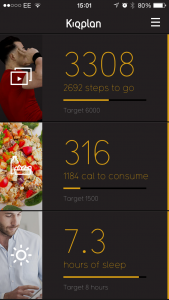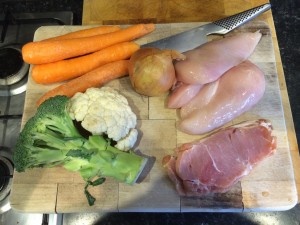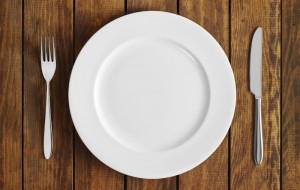Three Ways to Successfully Track Your Nutrition
Track Your Nutrition for Weight Loss Success
Despite what some people would have you believe, there is more than just one way to lose weight or eat a diet that is suitable to your requirements. If you track your nutrition properly you can lose weight by eating pretty much anything if you so wished.
You may look, feel and perform like crap, but you’d lose scale weight!
Each major diet movement has its total devotees – the evangelists who preach the gospel of the approach they follow and why it’s the best and all others should be abandoned. The Paleo crowd, the flexible diet crowd, the vegans, vegetarians, low carb, intermittent fasters and hardcore Ketogenic dieters have them.
The truth is, the best diet is the one you will stick to. The one you will stick to is the one you can control without feeling like your life is dominated by your food.
All successful diets have one thing in common – a way to track your nutrition. There are a number of different ways to track your nutrition, but this article highlights three of the most popular and successful.
1. Track Your Calories
This is an approach that the flexible dieters use. There are a few different ways you can do this, but I’ll highlight the two most common.
Method 1 – Break down your macros into percentages (protein, carbohydrates and fat), then eat according to these nutritional goals.
In practice, if you wanted to hit 2500 calories every day with a 50% carbs, 30% protein and 20% fat intake, you’d simply make sure you ate 312g of carbohydrate (4 calories per gram), 187g of protein (4 calories per gram) and 55g of fat (9 calories per gram).
You would do this by checking nutrition labels on your foods, using online calculators and weighing and measuring your portion sizes.
Method 2 – Ignore macronutrient split and simply aim for a calorie goal every day. This was the approach used by the early versions of Weight Watchers, where foods would be given a points score. Each score was assigned on the saturated fat content of each food.
The overall calorie goal is less health-focussed and more weight focussed, which is why it has been largely dropped (even Weight Watchers offer alternative approaches now).
Pros:
- It gives you a precise measurement of exactly how many calories you are consuming.
- It can allow you to eat ‘unhealthy’ foods as they can be accounted for in an overall plan.
Cons:
- It takes a lot of time and effort that some people just don’t want to invest.
- Some of the online calculators aren’t particularly accurate.
- Can be abused – clients can rely on junk food with little nutritional value as long as they don’t exceed calories or skew macros.
2. Achieve Particular Nutritional ‘Behaviours’
Many people benefit more from a behaviour tracking approach, where rather than count calories or macros, they have to achieve particular behaviours. The behaviour tracking approach is favoured by Precision Nutrition, where their clients are assigned behaviours such as ‘drink 2 litres of water’ or ‘eat 5 portions of green vegetables’ every day.
If the clients achieve these behaviours, they have by way of stealth eaten well as the behaviours will be the framework of a healthy diet, but specific to the individual.
This approach is fantastic for people who are new to nutrition or just don’t have the time/energy/interest to track their calories and macros. I personally think the behaviour approach is the most empowering for clients as it teaches them good habits. As with anything though, it doesn’t work for everyone; there are those who prefer more control and the calorie counting model would therefore be a better fit.
The behaviour model is flexible in that you can assign different behaviours to different clients. Some people may forget to drink enough water for example, so one of their behaviours may be to ensure they drink enough water every day. By assigning an importance to this behaviour, it makes it more likely to be stuck to. Other clients may have to eat more protein, more fish, take supplements etc; it’s a case of promoting good behaviours the client is lacking at that time.
Pros
- It allows for greater flexibility.
- Teaches good habits to keep calories under control, rather than a binge/starve approach that can be adopted under calorie counting.
- Can be flexible, allowing change at a speed determined by the client.
Cons
- Doesn’t provide the precision of calorie counting.
- Places responsibility with the client, which may not work in the early stages.
Practicing Intermittent Fasting
Intermittent fasting is an approach that some people use to great success. In essence, intermittent fasting allows a person to eat relatively high amounts of calories and then fast for a set period of time (this part is flexible, but anywhere from 12-36 hours is common). The idea is that fasting improves hormonal profile and keeps overall calories under control by way of avoidance during the fast.
I myself have dabbled with it and found it to be an excellent way of controlling nutrition. I still throw in an occasional fast if I feel I have over-indulged or could do with a bit of a digestive ‘break’.
Intermittent fasting has gained in popularity over the last couple of years, helped by books such as The Fast Diet. Whilst these books aren’t strictly intermittent fasting approaches in their purest form, they certainly have helped many people lose weight.
Pros
- Fasting helps people understand and control their hunger better.
- It’s a simple way of keeping calorie intake under control.
- Done correctly can help people feel great.
Cons
- Doesn’t work for those who cannot control the desire to eat.
- If done incorrectly can impair sporting and mental performance.
- Requires more nutritional understanding than the other two approaches.
The one thing that all of these ways to track your nutrition have in common is control.
They highlight that in order to be successful nutritionally there needs to be an element of control and awareness over what goes into your body on a daily or weekly basis. The method of control and tracking is less important than the fact that you are consistently tracking and aware of your nutritional habits.
If you are serious about losing weight, your approach can’t be slap-dash. You need to track your nutrition – just pick the way that suits you most.
By the way, I’ve now started a VIP email list with discounts, offers, tips and news. You can subscribe at on my homepage! Click here to sign up (blue box at the bottom).


